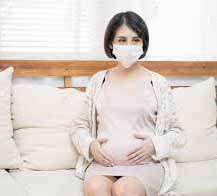Corona virus during pregnancy
Many have questions about the new coronavirus Covid-19 and
its effects on pregnancy and the baby. We've put together a summary of
frequently asked questions for parents and professionals.
Are pregnant women at increased risk for Covid-19?
ACOG, the United States obstetricians' professional body,
says the data currently available do not suggest that pregnant women are at
increased risk of developing Covid-19. However, if pregnant women get
respiratory infections, they are known to be at higher risk of experiencing
severe symptoms.
It is important to note that the new coronavirus Covid-19 is
not an influenza virus. Nevertheless, the symptoms of Covid-19 are flu-like and
the mode of transmission is flu-like, so some of our guidance in this
information is based on previous studies of pregnancy and flu viruses.
During pregnancy, the immune system changes, which prevents
the mother's body from recognizing her baby as a stranger and attacking her. But
these signs shows that pregnant women have lower immunity to disease. Pregnant
women also have an increased load on the heart and lungs. A healthy pregnant
woman is at increased risk of being hospitalized for the flu; in the first,
second and third trimesters of pregnancy, the risk of hospitalization increases
by a factor of 1.7, 2.1 and 5.13. If a pregnant woman already has or has had
health problems, such as diabetes or asthma, the risk factors are even higher.
Does Covid-19 affect pregnancy outcome during pregnancy?
If the expectant mother becomes seriously ill with the flu,
there is an increased risk of miscarriage or premature birth. A small study of
10 births in China found that maternal Covid-19 pneumonia at birth was
associated with fetal stress and preterm birth.
Can a sick mother pass Covid-19 to a baby?
While the baby is still in the womb, the placenta works to
protect the baby from disease. The placenta is an amazing organ that allows
antibodies to pass from mother to baby, and in most cases the placenta blocks
the transmission of disease to the baby.
In the case of common flu, an extensive hospital study found
no evidence of mother-to-child transmission of the infection through the
placenta.
In the case of Covid-19, initial studies from China suggest
that coronavirus can sometimes be passed from mother to child, but more studies
with larger groups of patients will be needed to confirm this. The most
frequently cited study in Wuhan, China, described 33 babies born to mothers
with coronavirus. Three of these babies were diagnosed with Covid-19 as
newborns, even though they were born by caesarean section. Despite the fact
that the babies suffered from fever and pneumonia shortly after birth, all
three babies recovered within one week and showed a negative result for
Covid-19.
After giving birth, a mother who is actively suffering from
Covid-19 can transmit the virus to the newborn through close contact. In this
situation, it is useful for the mother to milk the milk and provide the baby
with a caregiver to feed and care for the baby until the mother has recovered.
Does umbilical cord blood contain Covid-19?
As far as we know, umbilical cord blood does not contain
Covid-19, even if the mother is ill during childbirth. It is important to
clarify that there is a difference between studies looking for mother-to-child
transmission of Covid-19 compared to studies looking at the signs of Covid-19
in the umbilical cord blood; these are two separate topics.
When a person is infected with the respiratory virus, the
virus very rarely appears in the blood. The patient will have antibodies to the
virus in their blood, but not the virus itself. COVID-19 is extremely unlikely
to appear in cord blood.
A 2006 study by the American Red Cross on the involvement of
people infected with the influenza virus in the donor movement is hardly
mentioned in describing the current COVID-19 pandemic. The article predicts
that blood donated during an influenza pandemic will be safe, but there will be
a shortage of blood due to a malfunction of the blood center. That is exactly
what is happening now, and in response, the FDA has eased its restrictions on
blood donors.
Additional assurance that Covid-19 does not appear in
umbilical cord blood or neonatal tissue comes from a nine-natal study in Wuhan,
China. Nine mothers had Covid-19 pneumonia and their children were born by
caesarean section. While the babies were still in the sterile operating room
and before they had contact with their mothers, samples were taken of their
amniotic fluid, umbilical cord blood, and neonatal throat discharge. Later,
breast milk was tested. All of these specimens tested negative for Covid-19
using both the Centers for Disease Control and Prevention (CDC) test and the
hospital's internal reference-based laboratory confirmation of influenza virus
infection in respiratory specimens by reverse transcription polymerase chain
reaction (RT-PCR).
So if a mother has Covid-19 during pregnancy or even at
birth, she does not have to worry about the virus in the umbilical cord blood
or in the placental and umbilical cord tissue.
Protection against the virus with maternal antibodies
Again, the placenta is amazing: by protecting the baby from
disease, it allows the mother's antibodies to enter the baby's blood. The baby
inherits the mother's immune system and is resistant to most of the diseases to
which the mother is resistant until about the age of six months.
If the mother is immune to Covid-19, it is likely that the
newborn will be. Any woman who has recovered from the disease has protective
antibodies. A small study in Wuhan, China, confirmed that when six mothers with
Covid-19 pneumonia gave birth, all of their babies had antibodies to Covid-19
in their blood.







No comments:
Post a Comment